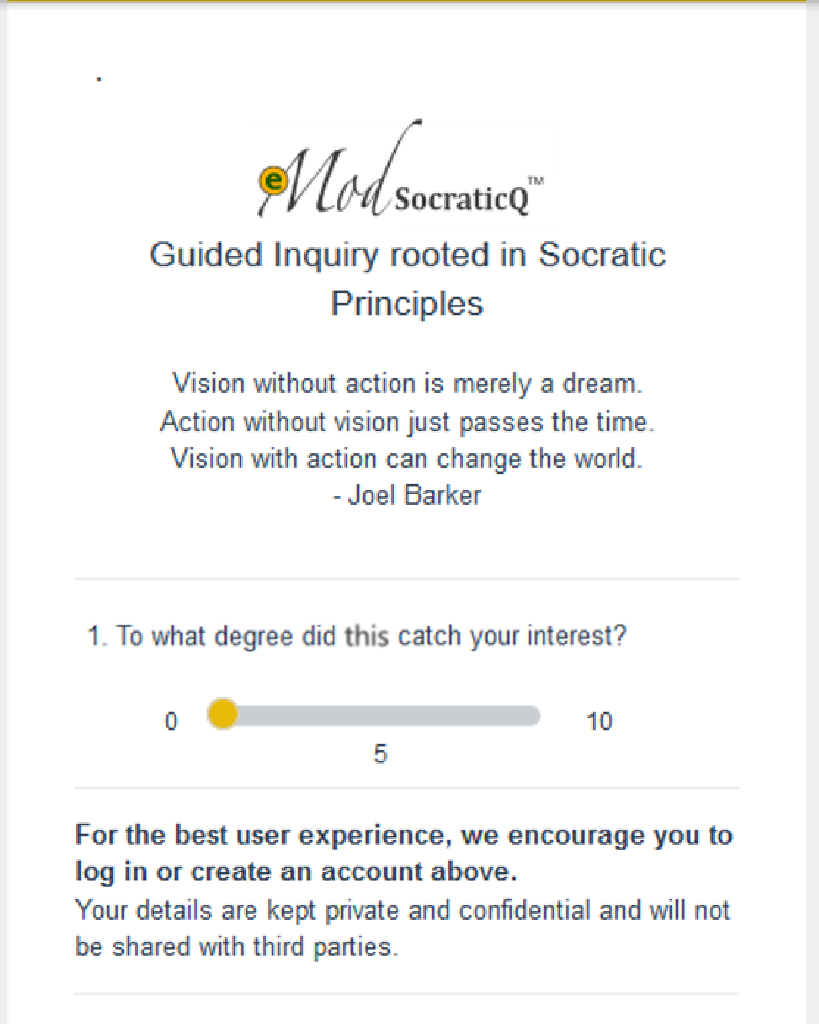
Opening Insights: Doomed by Evil
No evil dooms us hopelessly except the evil we love,
and desire to continue in,
and make no effort to escape from.
GEORGE ELLIOT, Daniel Deronda
The following article was published by The American Mind, “a publication of the Claremont Institute.” It was written by James McElroy, writer for The Washington Post.
Informational Insights: Progressive Nonsense? Think Again
Conservatives need to stop treating virtue signaling as if it didn’t matter.
This summer corporate America cheered on BLM and Antifa as they burned our cities. Now,Twitter and Facebook openly censor information, while Nasdaq asks the government to sanction their stringent new diversity mandates. These news items hammer out a familiar beat, offering a clear glimpse into our future. It is long past time to get smart on what this phenomenon truly represents.
The phrase “woke capitalism” often refers to the way multinational corporations ensure their advertisements reflect the latest woke pieties. It should be defined more broadly as the institutionalization of Left social doctrine by America’s top corporations—and the purge of any American who refuses to submit.
We all know Twitter suspends conservative voices at will, and that Google blocks conservative sites. Other tech companies like PayPal, Patreon, and Facebook censor anyone they deem unacceptable. But it’s a mistake to focus solely on deplatforming. Woke capitalism goes much further.
Behind closed doors, corporations hold seminars in which Ivy League professors, or other TED Talk types, explain that capitalism is racist and needs to be corrected with massive redistributions. More visibly, Goldman Sachs refuses to work on IPOs if the company is run by straight white males, Microsoft won’t hire law firms that fail to meet diversity requirements, and Credit Suisse created an equity index to track policies.
Bank of America pledged to donate one billion dollars over four years to fight racial inequality, and J.P Morgan pledged $30 billion over five years to lend explicitly based on race. The administrative state agencies supervising corporate compliance back these measures to the hilt. FINRA, the Financial Industry Regulatory Authority, insists that “our diversity and inclusion programs help our employees reach their highest potential—which, in turn, helps FINRA fulfill its mission of investor protection and market integrity.” The increase in militant woke thought is intimately tied to the structure of multinational corporations.
Older conservatives and leftists entertain two different, but related, misconceptions that make it difficult to see how the structure of these corporations drives woke culture. Many people like to believe that woke capitalism is insincere posturing. H.R. blather protects the company from lawsuits, woke ads build goodwill with progressives, and companies will use minority lending programs to create CDO products. Big deal—underneath it all, business remains the cold world of profit-seeking rationalism. Advertising is manipulative by its nature, therefore the most conspicuous examples lead people to believe that corporate America’s leftist positions are insincere. Purportedly, business only cares about the bottom line, and corporate America’s new persona is cynically dependent on how it impacts profit.
But Twitter’s and Facebook’s actions clearly prove this wrong: they cannot be explained in terms of profit. Nor is it the first time this has happened. In 2019, corporations openly opposed democratic self-rule by refusing to work in Georgia when the state passed restrictions on abortion. This was despite Georgia’s pro-business policies. Who cares if that was a publicity stunt?
It’s important to note where this radicalism is headed. When the company CoinBase asked its employees to keep politics out of the workplace, the former CEO of Twitter Dick Costolo stated that he would be happy when “me-first capitalists” get lined up and shot in the “revolution.” Now, The New York Times is writing hit pieces against CoinBase. Multi-millionaires LARP as Bolsheviks, while the GOP continues to confer sainthood on people who openly fantasize about their slaughter.
The people who work at these companies do, in fact, hate you. Their sincerity or depth of principle is irrelevant. Those who fret about the inconsistency or inauthenticity of today’s neo-totalitarians have spiritually surrendered, saying, in effect, “that KGB agent who dragged me to the Gulag and stomped on my face was so cynical. Probably hasn’t even read Marx’s Capital.” Conservatives who unreflectively champion “pro-business” policies without reference to their holistic impact on American life and culture simply work to fund people who hate them. And so to fight the new totalitarian menace, it will be necessary to rethink the institution that historically kept business interests in check: the labor union.
Consciousness Raising
Leftwing and populist critics of identity politics often argue that it is a tool of capital used to divide the working class. There is much truth to this, but it is important to remember that it’s a metaphor. A cigar-chomping Monopoly man didn’t cook up “white fragility” in order to bust a union. Many members of the elite earnestly believe the most radical tenets of woke thought. They have nothing but contempt for conservatives.
The classic Marxist response is that this doesn’t matter. The ideology of the upper classes grows out of their class position, obscuring that position in a “false consciousness.” The Bolsheviks disregarded all objections because they considered them a stalking horse for class interest. The Nazis pulled the same trick by replacing class with race. Western liberals did the same thing with the “authoritarian personality,” replacing class with “therapy.” Today, they just call you a racist. The endurance of this urge across the three different 20th-century regimes points to the connection between the old Left and the new corporate Left.
In original Marxist thinking, it was inevitable that workers across the world would rise up and overthrow the ruling class. When this didn’t happen Marxists needed an explanation. Lenin argued that the working class would never begin the revolution. They needed a vanguard of “professional revolutionaries.” This elite would see through the “false consciousness” of both the working class and the bourgeoisie, though how they would obtain this secret knowledge was left hazy and remains so. These revolutionaries performed a dual function: they were in charge of both educating the masses in proper revolutionary thought and managing the practical task of modernizing Russian industry.
Lenin is an odd entry point to modern American corporations, and it would be absurd to claim that today’s businesses are Marxist. Yet today’s managerial class serves the function of the professional revolutionary because they perform a practical economic role and consider that role the source of almost Gnostic knowledge that allows them to see “through” any objection to their will.
This is a rather dramatic description, but it can be tied back to the pedestrian aspects of corporate America. The “managerial class” is simply the people who run our large bureaucracies. The phrase doesn’t necessarily refer to economic status, but economic function. The bureaucracies can either be government or corporate. Both rely on the same talent pool, and the distinction is often less relevant than Republican rhetoric suggests.
Any large bureaucratic action, whether initiated by the government or a corporation, requires managers. A complicated tax code requires bureaucrats within the government to enforce, but also creates a vast army of Big Four consultants to help Amazon dodge it all.
In older forms of capitalism, the upper class’s economic advantages manifested at the individual level. The factory owner depended on workers, but received the lion’s share of profits because of individual property rights. Managers aren’t capitalists in the traditional sense. They don’t benefit at the individual level in the same way. James Burnham wrote that “the system of managerial economy might be called a type of ‘corporate exploitation’ as opposed to the ‘private exploitation’ of capitalism.” Burnham compared the way that managers achieve economic benefits to priestly castes in older societies. In the Catholic Church, the Cardinals have power because they pick the Pope, but no single individual picks the Pope. The managerial class confers benefits upon itself in the same manner as priests, and this shapes their worldview.
In large organizations labor gets divided into narrower fields of action, which introduces bureaucracy to new areas of life. One of the results is that the managerial class is often “thinking” on behalf of workers. The “sales representative” has to stick to a pre-written script, the “server” has to use corporate-approved greetings, and the Amazon warehouse worker must comply with efficiency guidelines. Now, in reality much of this is fake. The salesman ignores the script, the waitress says what she wants, and the Amazon worker simply drops dead. Despite this, there are huge apparatuses behind the endeavors. Large chain restaurants hire marketing strategy consultants who meticulously plan minor details like how the waitress speaks. Recent Ivy League graduates give very serious presentations with practiced intonations on how the “data proves scientifically that the optimized response is ‘have a zip-i-dee-doo-da day.” This claim to think on behalf of others operates at various levels within organizations.
H.R. managers come up with carefully calibrated “values” that senior leaders reinforce every time they speak. “At Globocore, we have four core leadership values. We do the work. We love the work. We share the work. And we have a heckin good time!” Now once again, this is fake, and everyone knows that, but again, there are real consequences. Fake corporate values are often used as the framework to assess performance, and so adult men have to justify why they shouldn’t be laid off with carefully documented lists of all the ways they had a heckin good time. The question of authenticity becomes irrelevant because the most ambitious use these “values” as tools to rise through the ranks. Despite everyone knowing that this is completely fake, the Harvard Business Review will come out with hundreds of articles on “defining corporate values.” The connection to woke politics should be obvious.
A class of people achieve economic benefits like a priesthood, work jobs where they tell others how to think, and promulgate nonsense “values” as a tool to achieve their own ends. Could that possibly be related to the rise of a pseudo-religious political movement that tells people what to think and promulgates transparent nonsense to achieve its own ends? It’s not a coincidence that Barack Obama always used the quintessential corporate phrase “our values.”
Workers of America, Unite
Behind every crazy woke idea is an implicit call to consolidate power within the managerial class, proving that there is never a clear distinction between the economic and cultural spheres. It’s not just “be nice online,” it’s “hire disinformation specialists.” It’s not just “use the proper pronouns,” but “hire these diversity managers.” Not just “abolish the police,” but “hire these social workers.” Racism is now defined as a metaphysical state of being that permeates everything, and so we must fork over piles of cash to the gnostic priests who understand the secret forms of bigotry hidden in your heart.
Multiculturalism grew out of an economy based on outsourcing jobs and importing cheap labor. Entire divisions of companies reside in foreign countries, and it’s only on corporate balance sheets that diversity is our strength. Wokeness is the radioactive mutation: a suicide cult whose self-loathing dogmatism negates everything a people need to rule themselves. The university is usually blamed as the originator of all this, but that is true only insofar as business has outsourced job training to college. Like multiculturalism, wokeness represents the political and cultural repercussions of an economy that refuses to invest in labor.
Conservatives should spend more time thinking about what it would mean to build effective 21st-century labor unions or guilds. Republican leaders often defect because woke concerns function as a way to signal class status. Conservatives need to find ways to nurture a new leadership class that isn’t crippled by status anxiety. The working class is less tied to woke pieties than the managerial class, and finding ways to increase their political agency would defang woke nonsense.
Tech monopolies can’t truly be fought without fighting their anti-American labor practices. Republicans spent a year fundraising off the threat of tech censorship, and then as soon as the election was over they rewarded big tech with cheap labor. A new labor movement could help curb immigration, reform the H1-B1 program, and lessen offshoring, while encouraging strategic manufacturing in America. New labor movements must also divorce the white-collar workforce from the university wherever possible. Most colleges are a total joke, and there are plenty of well-paying white-collar jobs with fancy titles that could be done by a 19-year-old. It’s time to end the charade. These are already popular issues among the populist Right, but it’s important to stress how they help cultural fights.
All of the weirdest woke concerns are consumerism run amok, and many “cultural” issues look an awful lot like economic developments. Despite delusions of sophistication, polyamory is the logic of subscription capitalism applied to the love lives of people whose fingernails are covered in Cheeto crust. Most importantly, rebuilt labor unions will give conservatives a way of organizing that actually matters.
America used to tell horror stories about how the Chinese Communist Party made news stories disappear. Now it happens in America. Despite 50 years of constant references to 1984, words in the dictionary magically change definition overnight. The COVID shutdowns have been an economic war against small businesses that have enriched a handful of oligarchs who lust after a “great reset.” Today, corporations are the locus of radicalism, and we are slipping into totalitarianism.
Woke Capitalism is not an aberration. It’s not going to be stopped by phony senators writing stern letters. It’s not a silliness that will go away. It’s not something constrained to Silicon Valley. The largest businesses in this country are run by a Leninist suicide cult that grows from our economic arrangements, and it’s going to be difficult to fight one without meaningful change in the other. Republicans must stop funding people who hate them, and instead build political infrastructure that actually helps their voters.
This article originally appeared in THE AMERICAN MIND: Woke Capital Isn’t a Game
Possibilities for Consideration: Beating the Enemy Without Fighting
The power that many would rely upon to reverse this doomsday scenario is the very same power that created the problem in the first place. It would be suicide to rely upon that power to fix our problems for us. It's not going to happen.
To win against the immense power behind the technology, internet and financial organizations in charge of our government and education institutions we must get smarter and do it together.
AwareComm® offers a platform that provides the resources and the guidance to meet this challenge.
It’s not just that we need a solution, in this new environment nobody will trust, everybody is angry, nobody listens, commerce stops, efficiency diminishes, nobody cares.
Our culture consists of perception, attitude, thinking and behavior and we have created a culture now rooted in distrust, fear and anger.
The following models illustrate the psychology of fear and control
being used to force America to its knees.
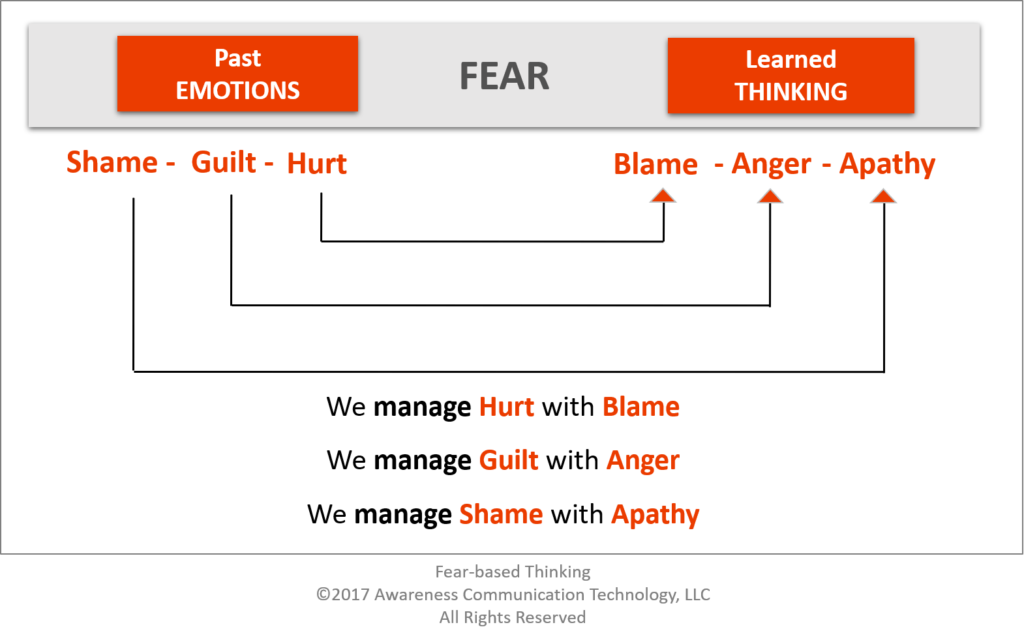
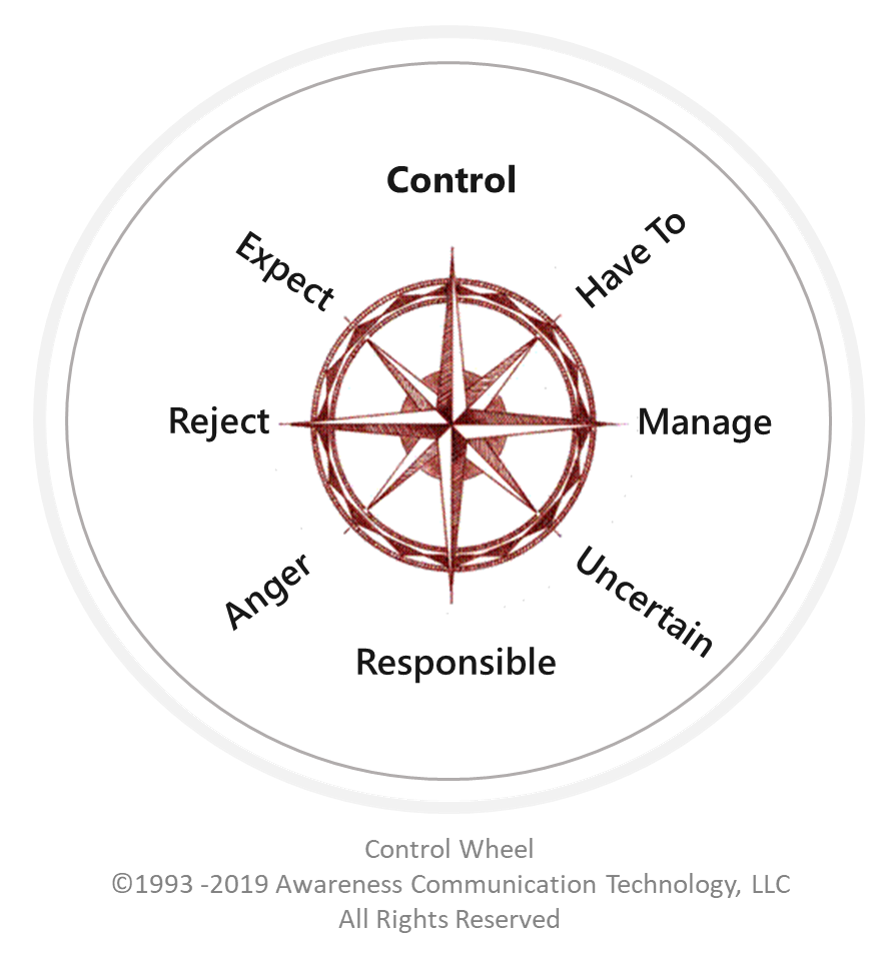
Whatever we do, however we do it, this becomes the basis for how we will build relationships at home, work, worship and play. These models will permeate all dimensions of our lives and must be reversed if our communities and our country are to survive.
The Real Solution: Founded in Spiritual Principles
A real solution, fully developed (tested, proven and paid for), is found in AwareComm's proprietary Adaptive Intelligence (AdI™) algorithm.
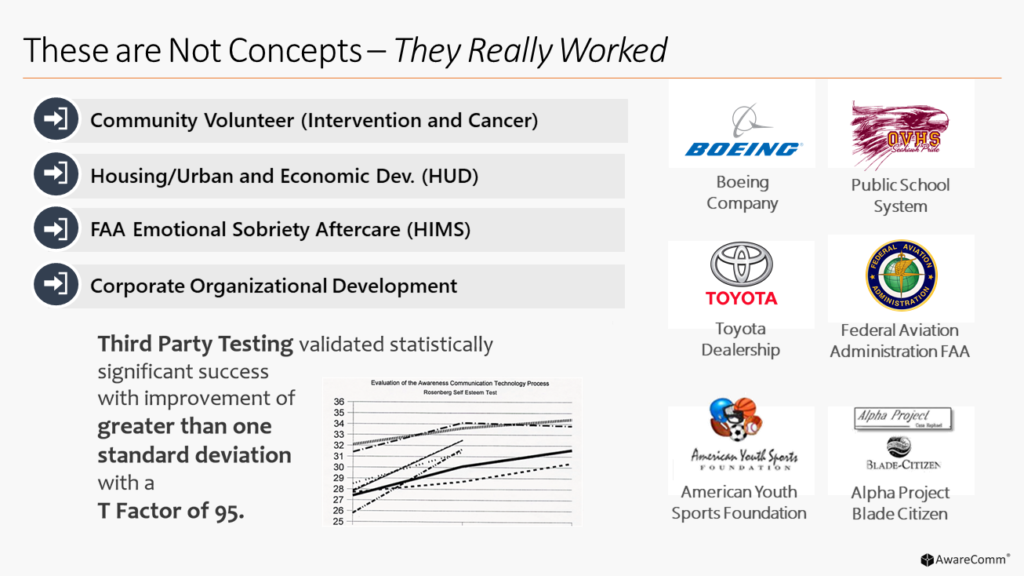
The AdI™ algorithm aligns with the intent of Pope Francis's call for a 'Good Algorithm,' to reverse the damage done by the irresponsible use of technology.
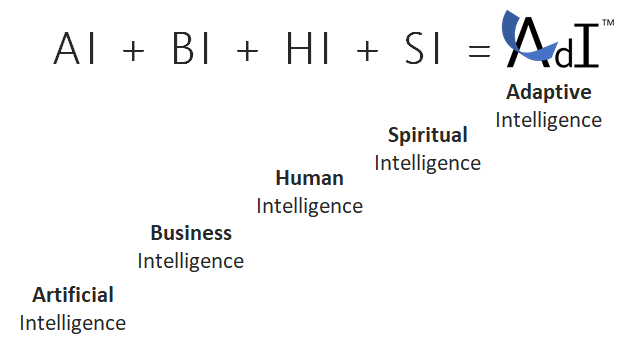
Rebuilding Community Commerce - - Rebuilding the Soul of a Community
AwareComm's AdI™ algorithm is available in a community Collaboration Laboratory (Co-Lab™) Research and ePublishing Institute, where people learn to take charge of their communities by transcending adversity to diversity and solidarity through the application of responsible commerce. Success is assured by applying the principles of Adaptive Intelligence to entrepreneurial thinking using socially responsible capitalism.
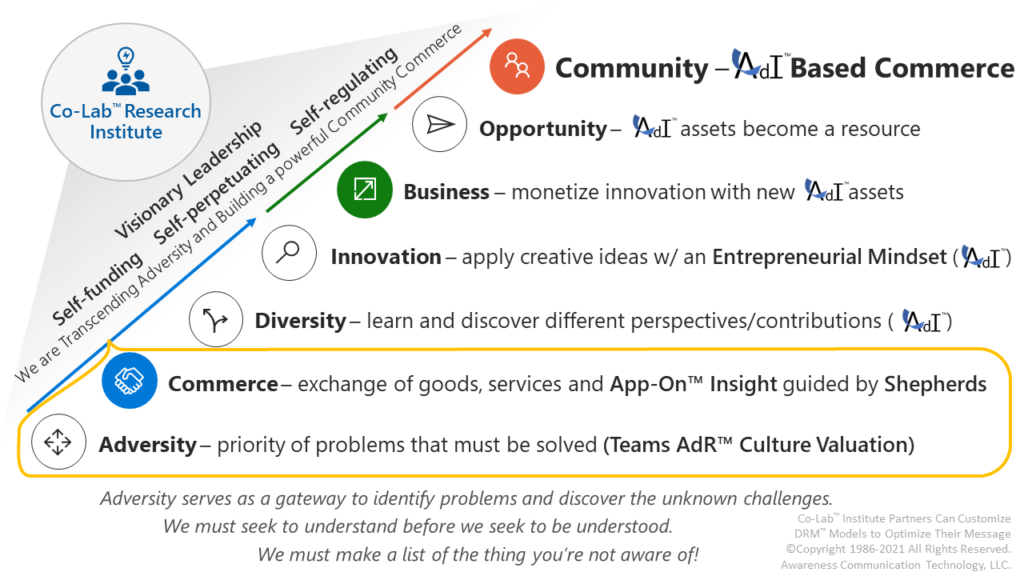
What comes from an established foundation of commerce rooted in spiritual principles and AdI™ is a new business model. This business model, for the application of Socially Responsible Capitalism, is our theme and driving inspiration.
A Co-Lab™ is the implementation mechanism of the result of 30+ years of field research.
Co-Labs™ create an environment conducive to learning, solidarity and change (old ideas are more quickly learned and new ideas are more quickly accepted and implemented).
Our Next Step
The AwareComm® Team is attracting partners in order to awaken in the people a desire for peace and solidarity as a way to fulfill their personal needs.
Through a careful blend of AI + BI + HI + SI the Co-Lab™ Research Institute has the correct balance of technology, methodology, human understanding, spiritual principles and data science to put us on the right track to individual social and cultural empowerment.
Due Diligence classes offer a deeper dive into the Co-Lab™ Research and ePublishing Institute to determine if this philosophy is effective for your community. You will learn:
- The logical power of the AI + BI + HI + SI = AdI™ algorithm for communication and learning
- The communication power of Co-Lab™ Research and ePublishing Institute to provide secure:
- self-funding
- self-perpetuating
- self-regulating networks
- The commerce power of Socially Responsible Capitalism, blending nonprofit and commercial applications
- The application of Social Partnerships, bringing ethical business principles to overcome social challenges
- The joy, satisfaction and pride of taking a role in returning our world to a state of freedom and opportunity - being proud to be a patriot
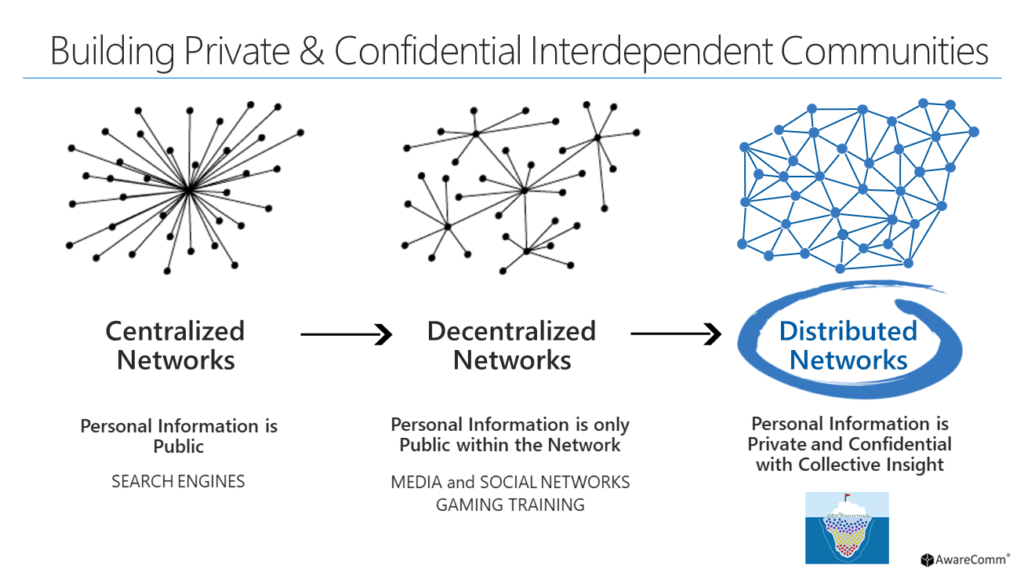
Inviting Potential Partners
For more information
and to receive your invitation to a Due Diligence class
email: SOS@AwareComm.com

